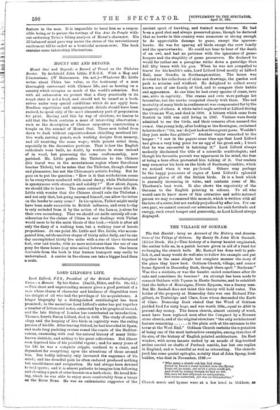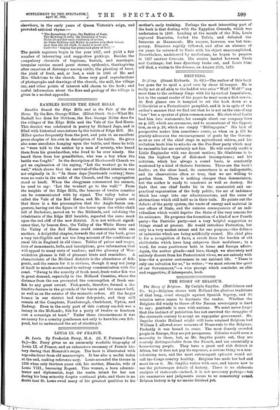THE VILLAGE OF OCICHAllf.
The Oak Hamlet : being an Account of the History and Associa- tions of the Village of Ockham. By Henry St. John Hick Bastian. (Elliot Stock. 21s )—This history of a Surrey hamlet originated, the author tells us, in a parish lecture given in aid of a fund for re-hanging the church bells. Mr. Bashtill has done well to pub-. lish it, and many would do well also to follow his example and put together in the same simple but complete manner the story of the place they know best. Ockham Church, village, and manor house figured in Domesday Book, though there spelt " Boeheam." Was this a mistake, or was the hamlet called sometimes after its oaks and sometimes its beeches ? An attempt has been wade to connect Ockham with Yquem in Haute Sauterne, and to establish that the father of Montaigne, Pierre Eyquem, was a Surrey man. But Mr. Basha.11 does not think this theory will hold water. The holder of the property at Domesday date was one Richard Fitz- gilbert, de Tonbridge and Clare, from whom descended the Earls of Clare. Domesday Book stated that the Wood of Ockham yielded food for sixty hogs, and was worth 100s, equal to .2300 in present-day money. The Saxon church, almost entirely of wood, must have been replaced soon after the Conquest by a Norman stone church, and of the original structure "the only architectural
feature remaining is the plain arch at the entrance to the tower at the West End." Ockham Church sustains the reputation of being one of the most instructive examples, among churches of its size, of the history of English pointed architecture. Its East window, with seven lancets united by an arcade of dog-toothed arches carried on shafts of Purbeck marble, has bat one replica in England, and is beautiful as well as interesting. The church- yard has some quaint epitaphs, notably that of John Spong, local builder, who died in November, 1736 :—
" Who nung a sturdy oak has laid along Felled byDeath's surer hatchet here lies Spong. Posts oft he made, yet ne'er a place could get, And lived by railing though he had no wit. Old saws he had although no millenarian, Aud styles corrected, yet was no Grammarian."
Church music and hymns were at a low level in Ockham, as
elsewhere, in the early years of Queen Victoria's reign, and provoked satirical rhyme :—
" The Squeaking of pigs, the Barking of dogs,
The Howling of owls, the Grunting of hogs, Make altogether such confusion of noises, As when Ockham and Ripley in psalms join their voices, And then the old clerk, to make it more odd, Calls this 'singing the praise and glory of God."
The parish registers begin in the year 1567, and yield a fair number of interesting and suggestive pickings. Besides the compulsory chronicle of baptisms, burials, and marriages, irregular entries record great storms, epidemics, thanksgiving after cessation of distemper among cattle, the planting of trees, the yield of fruit, and, at last, a visit in 1896 of Mr. and Mrs. Gladstone to the church. Some very good reproductions of photographs and drawings of the church, the mill, the village inn, and other points of interest add charm to the book; and useful information about the flora and geology of the village is given in a modest appendix.























































 Previous page
Previous page